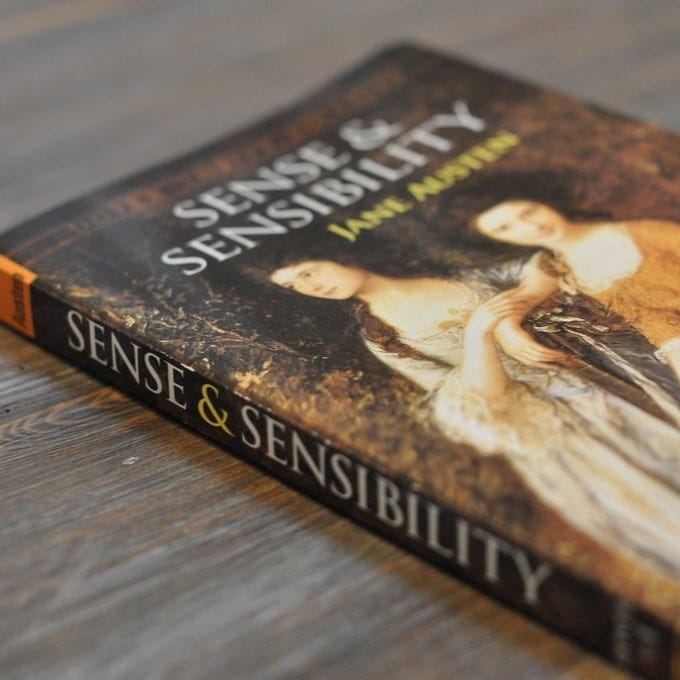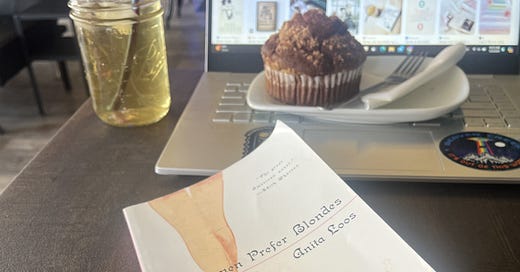"Gentlemen Prefer Blondes" & Jane Austen
How this cult classic is actually in the lineage of Jane Austen's feminist novel....


A professor once told me Jane Austen’s novels and those in her lineage answer the question, “Can a girl of humble means use her virtue to marry above her class and grant herself freedom?”
Austen’s novels, while undoubtedly romantic, delve into the intellectual depth of women striving to improve their social status. These women, often without paternal support and in precarious economic situations, find love at the opportune moment. While popular adaptations may emphasize the romance, the original stories are rich in societal and financial exploration.
Similarly, Gentlemen Prefer Blondes answers, “Can Lorelei use her charms effectively enough to rise above her humble means and join high society?”
This novel was written by Anita Loos in 1925 and eventually adapted into the movie starring Marilyn Monroe in 1953. The movie version is more widely known, but the novel is much more nuanced.
At first glance, the main character Lorelei may appear to be a stereotypical 'dumb blonde ', relying on her beauty to navigate society and acquire gifts from men. However, a closer examination reveals her strategic cunning and acute understanding of her societal position.
On Lorelei’s adventures in London, she comes across a diamond tiara and becomes set on owning one herself. However, she has no money of her own. So, she must get a man to fall in love with her enough to buy her one. She befriends a man who is unhappy in his marriage and convinces him that he looks so handsome in his military uniform that she would only look right with him if she had a diamond tiara.
The section concludes with Lorelei saying, “So now I have a diamond tiara, and I have to admit that everything always turns out for the best.”
The novel, presented as Lorelei’s diary shared with her admirers, invites the reader to actively participate in decoding her intricate schemes. This interactive style of writing not only allows the reader to fall in love with Lorelei, but also to appreciate her cunning and strategic thinking.
Lorelei’s exploits in Gentlemen Prefer Blondes are perhaps more evident than those of Jane Austen’s heroines, but they are no less present in the latter.
The heroines of Sense and Sensibility both make efficient matches in the end. Elinor is fond of Edward, but he is also a very sensible match. She is attracted to him for his honorable demeanor and potential to treat her well as a husband. There may be love, but it is undeniable that Edward would also lift her out of her situation.
Elinor’s sister Marianne starts as a hopeless romantic and falls in love with a relatively poor man awaiting a potential fortune. However, he marries someone more wealthy, leaving Marianne distraught. Eventually, Marianne ends up with the much older and very wealthy Colonel Brandon. It is clear throughout the novel that Marianne is uninterested in him. She finds him too old, unattractive, and boring. Their marriage shows a more pragmatic type of relationship — one where they both need companionship, and Marianne accepts the match she can find.
The possibility of love is present in both of these relationships, but both women accept an advantageous match without many notions of passion.
Through these observations, I am not saying that Jane Austen’s novels are not romantic or aspirational. These stories would have been quite romantic to young women of the time. A rich man whisking a young woman off to be his wife, regardless of love, was the ideal situation for Austen’s readers. Marriage in the Regency Period was more commonly a vehicle of social signaling than one of love. Marrying well allowed young women freedom. They could live without concern for money and frequently without too much male supervision since their husbands often traveled.
Similarly, Lorelei is unconcerned with love. At least, she is unconcerned with feeling love herself. By the novel's end she marries Mr. Montrose, a very wealthy but boring man who spends most of his time with his family in Philadelphia. This coupling is not one of passion but one that allows Lorelei to live the life she desires.
The novel's last line echoes an earlier line saying, “And so I really think that I can say good-bye to my diary feeling that, after all, everything always turns out for the best.”
With this pronouncement of Lorelei’s happy ending, Gentlemen Prefer Blondes joins the lineage of Jane Austen. While these novels revolve around marriage, they do so distinctly and radically. They assert that a woman can control her destiny and use her intelligence to carve the life she wants.
Gentlemen Prefer Blondes shocked me with its clever understanding of social dynamics and truly feminist commentary. I recommend to anyone who believes in the power of a woman’s intelligence to read it — and take notes…




